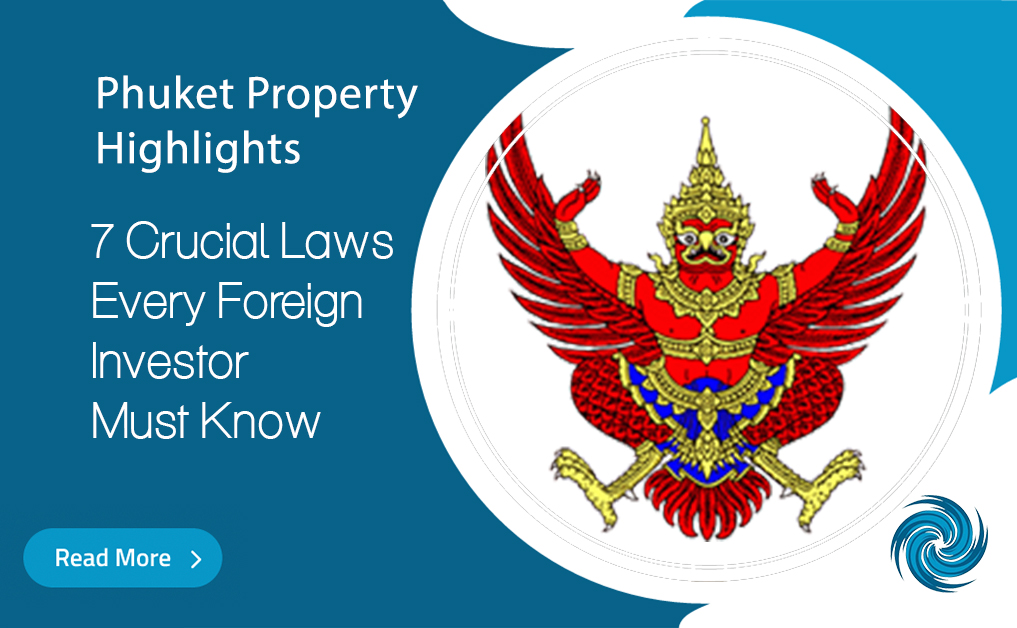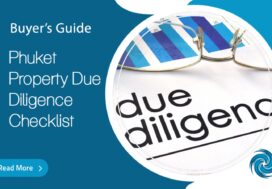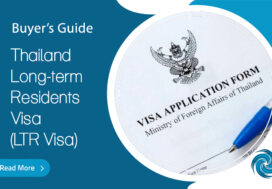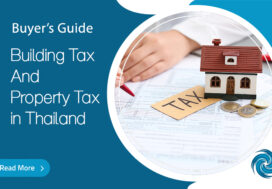
7 Essential Rules Every Overseas Investor Needs to Be Aware of, for Achieving Property Success in Phuket by 2024
Are you thinking about owning a piece of paradise in the haven of Phuket? Before immersing yourself in the captivating property scene of Phuket it’s crucial to understand the framework governing foreign property ownership. In this handbook we will uncover the seven crucial rules that could either make or break your investment aspirations. Don’t jeopardize your earned funds – equip yourself with the knowledge to excel in the Phuket property market.
Phuket, Thailand’s island has always been a hotspot for international investors looking for a blend of lifestyle and financial rewards. With its beaches, vibrant culture and thriving tourism sector the appeal of Phuket’s property market is irresistible. Nevertheless the journey to owning property as a foreigner involves navigating through intricacies that demand attention.
In times Thai authorities have. Honed regulations to strike a balance between foreign investments and national interests. For investors comprehending these laws is not about adherence – it’s, about safeguarding your investment and optimizing your gains within a legally secure framework.
Let’s explore the seven rules that every overseas investor must grasp to prosper in Phuket’s property market in 2024.
Table of Contents
Toggle1. The Foreign Ownership Restriction on Land
The law concerning ownership of land, in Thailand as established in the Land Code Act B.E. 2497 (1954) prohibits foreigners from holding ownership of land within the country including popular areas like Phuket. The main purpose behind this regulation is to safeguard sovereignty and prevent influence over national resources.
Key Points:
- Foreigners are not allowed to own land under their names.
- This restriction covers types of land including commercial and agricultural properties.
- Violations could lead to the forced sale of the property and potential legal repercussions.
Implications: This limitation significantly impacts the investment options for foreigners often steering them towards investing in condominiums or exploring ownership structures for villas and houses. It should be noted that while land ownership is restricted foreigners can still own buildings on leased land.
Exceptions: There are exceptions to this rule such as incentives offered by the Board of Investment (BOI) or inheritance from a Thai spouse; however these paths are not commonly utilized by investors.
Strategy Tip: For those considering investments, high quality condominiums in sought after locations could be an option. Additionally exploring arrangements for villas may be beneficial. If owning land is essential, for your plans it may be worthwhile to explore company setups with appropriate Thai partnerships.
2. The Condominium Act: Your Gateway to Freehold Phuket Property Ownership
The Condominium Act serves as a gateway for foreigners to own property, in Phuket through condominium ownership. This allows foreign buyers to own condo units outright on a regular basis.
Key Points:
- Foreigners can possess up to 49% of the unit space in any condo project.
- Ownership is officially registered under the buyer’s name at the Land Office.
- Condos must be part of a certified project.
In-depth Analysis: The 49% limit on ownership is determined by the floor area of all units in the condominium not just the number of units. This implies that in projects foreigners may end up owning than 49% of the units if they are smaller in size.
Legal Protections: The Condominium Act offers protections for foreign property owners. Your ownership is documented on the title deed of your condo unit (known as a Chanote) granting you property rights, to Thai owners.
Financing: Unlike land purchases foreign purchasers can often secure loans from banks for buying condos usually ranging from 50 70% of the property’s value.
Considerations:
- Verify the foreign ownership quota before making a purchase as some popular projects might have already reached their limit.
- To better comprehend the management structure and ongoing fees of condominium juristic it’s important to take into account the resale market especially since you may eventually sell to expatriates.

3. Leasehold Structures for Land and Houses
When looking for a villa or house, in Phuket leasehold arrangements can be a choice to navigate around land ownership restrictions.
Key Points:
- Foreigners have the option to lease land and properties for up to 30 years with the chance of extension
- The lease is officially recorded at the Land Office offering a level of security
- Certain investors opt for 30 year leases as a strategy for longer term control
In-depth Examination: While a 30 year lease can be officially registered it’s common practice to structure agreements that include renewal options extending up to 90 years (30+30+30). However it’s crucial to note that only the initial 30 year period holds weight.
Legal Factors:
- Renewal options essentially rely on an agreement and may not be enforceable if there are changes in ownership or if the landowner declines to honor the arrangement
- Thorough legal documentation and diligent checks, on the landowner are imperative.
4. The Thai Company Limited Option
In order to set up a company it’s required to have three shareholders. To empower foreign minority shareholders special voting rights can be arranged for them. Keeping records and submitting yearly tax returns are essential, for the company’s compliance.
Key Points:
- A Thai company with foreign majority ownership can own land if at least 51% of shares are held by Thai nationals
- The company must be a legitimate, operating business, not just a shell for property ownership
- Thai authorities scrutinize these structures closely
In-depth Analysis: While this method has been used successfully by many foreign investors, it comes with significant risks and ongoing compliance requirements:
Legal Structure:
- The company must have a minimum of three shareholders
- Preferential voting rights can be structured to give foreign minority shareholders more control
- The company must maintain proper accounting records and file annual tax returns
Operational Guidelines:
The company should have a business purpose beyond owning property. It must adhere to all Thai business laws, including obtaining work permits for directors.
Scrutiny and Risks:
Authorities in Thailand are increasingly investigating businesses suspected of using nominee shareholders. Violating foreign ownership regulations may lead to penalties such as selling off the property and facing charges.
Strategy Tip: If considering this route ensure adherence and be ready for ongoing administrative expenses. Evaluate the sustainability of running a Thai company in the run.
5. Investment Promotion Act; Opportunities, for Major Investors
Under the Investment Promotion Act managed by the Board of Investment (BOI) there are chances for significant investors to receive exemptions from foreign ownership restrictions that can benefit Thailand’s economy.
Important Points:
- When foreign investors bring in an amount of capital and benefits, to Thailand they may be given permission to own land.
- This is usually applicable to projects or businesses in sectors that are promoted.
- The land granted is limited to what’s necessary for the businesss operations.
Detailed Analysis: Meeting the criteria for BOI promotion can be
Eligibility Requirements:
- Investments should be in sectors that are considered advantageous for Thailand’s economic and social progress.
- The minimum investment required varies depending on the sector and location.
- Projects must adhere to standards related to technology transfer, local employment and boosting exports.
Advantages:
- Permission to own land for business purposes.
- Possibility of tax breaks, such as exemptions from income tax.
- Stringent rules on bringing in experts and technicians.
Constraints:
- Ownership of land is linked to the business activities being carried out.
- If the business shuts down the land typically needs to be sold within a timeframe.
Strategic Advice: This option works best for large scale property developments or businesses with resources. Seek guidance from BOI consultants to determine your projects eligibility and navigate through the application process.
6. Restrictions on Foreign Business Control
The Foreign Business Act (FBA) restricts participation, in business operations including aspects of real estate dealings
Important Points:
- Engaging in property rental and real estate agency operations, in Phuket’s limited to regulations.
- To conduct these activities one must have either majority Thai ownership. Obtain a Foreign Business License.
- Violating these regulations can lead to penalties, imprisonment and even closure of the business.
Detailed Examination: The Foreign Business Act (FBA) classifies business operations into three lists with varying levels of restrictions;
List 1: Activities that’re completely off limits to foreigners (such as land transactions)
List 2: Activities forbidden unless granted permission by the Minister of Commerce with Cabinet endorsement
List 3: Activities restricted unless authorized by the Director General of the Department of Business Development with approval from the Foreign Business Committee
Real Estate Implications:
- Foreigners are not allowed to engage in property buying and selling as a business endeavor.
- Renting out properties is limited for short term rentals like weekly stays.
- Providing agency or brokerage services in estate is also subject to restrictions.
Compliance Suggestions:
- To navigate activities smoothly consider structuring long term leases (of at one month) as a potential way around FBA limitations.
- Collaborate with Thai individuals or businesses for activities that are restricted.
- Although obtaining a Foreign Business License is an option bear in mind that approval is not assured and the application process can be intricate.
Tip, for Strategy; Make sure to organize your property investment and any associated business activities, in alignment with the regulations of the Foreign Business Act (FBA). Consider collaborating with Thai real estate management firms for agency services.

7. Tax Regulations for Overseas Property Owners
It is essential for foreign investors in Phuket to comprehend and adhere to the tax laws of Thailand.
Key Points:
- Different taxes are applicable to property transactions and rental income.
- Tax rates and rules may vary for foreigners in comparison to Thai citizens.
- Effective tax planning can significantly influence the profitability of your investment.
Detailed Analysis:
Property Transfer Taxes:
- Transfer Fee; 2% of the registered value
- Specific Business Tax; 3.3% (inclusive of tax) if the property is held for than 5 years
- Stamp Duty; 0.5% (applies only if exempt from Specific Business Tax)
- Withholding Tax; 1% for individuals 1%, for companies
- We have an article that provides a breakdown of transfer fees and taxes. You can access it through this link; Property Transfer fees and Taxes in Thailand.
Understanding the tax implications of income:
- Personal Income Tax**; Individuals face rates, up to 35%.
- Corporate Income Tax**; Companies are taxed at a rate of 20%.
- Withholding Tax**; Foreign individuals receiving payments are subject to a 15% withholding tax, which can be offset against tax liabilities.
Capital Gains Tax:
- Individuals are taxed on capital gains as income at rates.
- For companies capital gains form part of their income tax obligations.
Value Added Tax (VAT):
- A 7% VAT is levied on short term rentals ( than 30 days) if the annual income exceeds 1.8 million THB.
Double Taxation Treaties: Thailand has established agreements with countries to prevent double taxation. Understanding these treaties can help optimize your tax situation.
Strategic Advice: It is advisable to seek guidance from a Thai tax specialist when structuring your investments. Consider the tax implications associated with ownership structures (company, offshore) and rental strategies (short term versus long term).
By gaining in depth knowledge in these areas of Thai property law foreign investors can confidently navigate the intricacies of Phuket’s real estate market with enhanced assurance and certainty. It is recommended to consult with financial professionals to tailor these insights according to your specific investment objectives and circumstances.
Frequently Asked Questions
Can I buy Phuket property using a foreign company?
Foreign companies face the same restrictions as foreign individuals regarding land ownership. However, they can own condominiums within the 49% foreign quota or use leasehold structures for land and houses.
Is it safe to invest in off-plan Phuket property?
Off-plan investments can offer good value but come with risks. Ensure the developer has a track record, all necessary permits, and that your payments are protected. Consider using an escrow service for added security.
Can I obtain residency in Thailand by investing in Phuket property?
Property ownership alone does not grant residency rights in Thailand. However, substantial investments may qualify you for certain visa categories, such as the Thailand Elite Visa program.
Navigating property investment laws in Phuket as a foreigner demands thoroughness, familiarity, with practices and innovative approaches.
The legal system, in estate can appear intricate. Its purpose is to offer clarity and safeguard all parties involved in property transactions.
By familiarizing yourself with and following these seven laws you can set your Phuket property investment up for success while reducing risks. Remember compliance goes beyond avoiding fines; it’s about establishing a groundwork for a potentially profitable and enjoyable investment in one of the most stunning locations on earth.
As regulations continue to change staying informed and adaptable will be crucial, for your prosperity. It’s advisable to collaborate with legal professionals and real estate experts specializing in international investments to navigate this intricate terrain effectively.
With the strategy your aspiration of owning a slice of paradise in Phuket can come true – one that’s both legally secure and financially beneficial. Are you prepared to move towards your tropical Phuket property investment?
Contact Us
Do not hesitate to contact us if you have any further questions on the subject, or if you would like to know more about property in Phuket in general.







